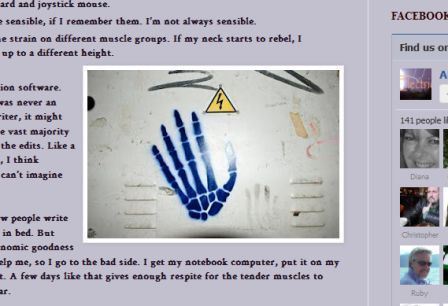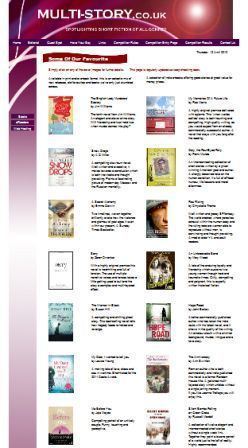Roz Morris's Blog, page 97
April 26, 2012
‘I feared I’d never get the blurb finished in time for the launch’ – guest post at Jami Gold’s
2. Stuff that into three paragraphs or so.
3. Don’t leave out anything important.
Welcome to summarising your book for the back cover or for pitching to an agent.
A few of you may well remember the frantic email sessions last summer as we batted ideas back and forth for my novel’s flap copy. I proved that despite having written a reasonably lucid novel, I was entirely incapable of distilling it into a suitable blurb. I think it took six weeks, several false starts and wrong turnings – many of which I didn’t want to abandon because they’d been hard enough. Did three paragraphs ever cause such anguish?
Anyway, I learned a lot in the process, and today I’m at the blog of paranormal author Jami Gold, sharing all my tips.
One of those tips is to not become too attached to the wrong soundbite. Boy, I nearly hobbled myself there. You can see my blurb outtakes at Jami’s lovely blog, but in the meantime I thought it would be fun to share here some wrong blurbing that we’ve done.
too attached to the wrong soundbite. Boy, I nearly hobbled myself there. You can see my blurb outtakes at Jami’s lovely blog, but in the meantime I thought it would be fun to share here some wrong blurbing that we’ve done.
Tell me, in the comments, the blurb or pitch you had to junk – and why it was soooooo wrong. I look forward to sharing your pain…








April 24, 2012
‘Music to drum up teen feelings about life, adventure and parents who didn’t understand’ – The Undercover Soundtrack, Kevin McGill
 My Undercover Soundtrack guest this week is Kevin McGill – one half of my favourite books podcast, Guys Can Read. To write his epic adventure fantasy Nikolas & Company, he needed to get back in touch with his early teen self – but his book’s soundtrack goes way beyond mere angst. There’s music for magic, mythology, mayhem – and even, ahem, ‘girl scenes’. I’ll let him explain all that, and more, on the red blog
My Undercover Soundtrack guest this week is Kevin McGill – one half of my favourite books podcast, Guys Can Read. To write his epic adventure fantasy Nikolas & Company, he needed to get back in touch with his early teen self – but his book’s soundtrack goes way beyond mere angst. There’s music for magic, mythology, mayhem – and even, ahem, ‘girl scenes’. I’ll let him explain all that, and more, on the red blog
Psst! World Book Night special… The Red Season (My Memories of a Future Life Episode 1) is still free until 28 April… UK and US. Spread the word…








April 22, 2012
It’s World Book Night – and The Red Season is free
 Today and tomorrow – 23rd and 24th April – depending on your time zone, hundreds of thousands of bookworms are celebrating their love of reading with gifts in World Book Night (which you can find out more about here). At the Authors Electric blog we’re marking the occasion with a giveaway event of our own. One of the free titles is Episode 1 of My Memories of a Future Life - The Red Season, which you can find here (UK or US) – and while you’re at it you’ll also find nearly a dozen other fine books at the Authors Electric blog.
Today and tomorrow – 23rd and 24th April – depending on your time zone, hundreds of thousands of bookworms are celebrating their love of reading with gifts in World Book Night (which you can find out more about here). At the Authors Electric blog we’re marking the occasion with a giveaway event of our own. One of the free titles is Episode 1 of My Memories of a Future Life - The Red Season, which you can find here (UK or US) – and while you’re at it you’ll also find nearly a dozen other fine books at the Authors Electric blog.
Edits forbid a proper writing post right now, as you probably guessed from all the moaning about sore arms. Anyway, I reckon with all those free goodies you’ll be knee deep in reading for a few days (and some titles are free for a few days afterwards so if you’re getting here late it’s still worth checking them out). There will be an Undercover Soundtrack as usual on Wednesday and I hope I’ll be back with a writing nugget next weekend. In fact, if you want to suggest a topic, now’s your chance. In the meantime, happy World Book Night.
Thanks for the pic, Sebastian Antony








April 20, 2012
RSI and when your books come back to haunt you – post at Authors Electric
 I like to think I’m a decent human and would never hurt a fly. But in my books I’m vile.
I like to think I’m a decent human and would never hurt a fly. But in my books I’m vile.
It bothers me. I used to wake at night worrying about what it would really be like to have the troubles that Andreq and Carol have in My Memories of a Future Life. And what’s happening in Life Form 3 is definitely the stuff of nightmares.
So when I woke with the most debilitating RSI the other morning, like poor Carol, I thought I was getting my just desserts.
I’m at Authors Electric today, discussing authorly karma – and also what I do when I am (as regularly happens) struck down by repetitive strain injury.
(thanks for the pic Lizspikol)
Do you get RSI – and what do you do about it? How bad are you to your characters? Are you grateful you don’t have to live their lives? Tell me here – or come over to Authors Electric








April 17, 2012
‘George Winston’s dreamy piano had to go’ – Andrew Blackman, The Undercover Soundtrack
 Each novel we write stretches us in different ways. Andrew Blackman had previously always written to a background of swirling piano and josssticks, but when he started an urban tale of frustrated youth, he decided it was time to grit up. Cue a new era of Bob Dylan, Jimi Hendrix and Supergrass, to name but three. The result, On The Holloway Road, won the Luke Bitmead award and was shortlisted for the Dundee International Book Prize. Join me on the red blog to hear about its Undercover Soundtrack
Each novel we write stretches us in different ways. Andrew Blackman had previously always written to a background of swirling piano and josssticks, but when he started an urban tale of frustrated youth, he decided it was time to grit up. Cue a new era of Bob Dylan, Jimi Hendrix and Supergrass, to name but three. The result, On The Holloway Road, won the Luke Bitmead award and was shortlisted for the Dundee International Book Prize. Join me on the red blog to hear about its Undercover Soundtrack








April 15, 2012
How to write great guest posts about your book – keep your stories about your stories
 ‘Do you know how I came up with the new ending for my book?’ said my client. ‘I dreamed it.’ She went on to describe a wonky version of what finally went into the draft I was reading.
‘Do you know how I came up with the new ending for my book?’ said my client. ‘I dreamed it.’ She went on to describe a wonky version of what finally went into the draft I was reading.
‘Keep this anecdote,’ I said. ‘Write it down.’
‘Pah it’s just a dream,’ she said. ‘I was also inspired by this strange thing that happened to a friend…’
‘Write that down too,’ I said.
She thought I was mad, and no doubt you do too. But there will come a time when you will be scratching for things to say about your book and you need something beyond a story summary or a sketch of your main characters.
Awkward moments
I first realised this years ago at a friend’s book launch. I’d just finished My Memories of a Future Life and I got chatting to a publisher. I gave my prepared spiel and he nodded eagerly, wanting more. I’d run out of pitch, so I bumbled on about my favourite bits, aware that I was getting obscure, but I was so mired in the book I couldn’t see it as an outsider. What I needed was a crisp anecdote or two to keep him relating to it – perhaps about its influences or what inspired it. (He still asked to see it, though, so no harm done.)
Publicity is a long game of guest posts, interviews and maybe personal appearances. (At the moment, Dave is gearing up for the launch of his Frankenstein book app, and is grappling with interview questions. ‘What on earth do I tell all these people?’ he frequently says to me. ‘I thought it was enough to just write the story.’)
Blah blah blah
There’s only so much you can say about the novel without giving spoilers. And you’re going to be asked the same questions time and again about the writing of it, but that doesn’t mean you have to give the same answers. In fact, you shouldn’t. In each case you might reach a new audience, but the chances are, readers will see you several times before they decide to check you out. The more different – but congruent – stories you can tell about your book, the richer it will seem and the more ways you have to reel readers in. And the less you’ll bore everyone, including yourself.
And people who like stories also like stories about stories. I recently added an ‘inspired by’ anecdote to my Amazon listing for My Memories of a Future Life and sales have trebled. This experimental sample of just one seems to prove somethingorother.
 What makes a good story about your story?
What makes a good story about your story?
The very best are specific but don’t give too much away. It could be
novels that influenced it
favourite fictional characters that spurred you to write it
real-life experiences that fed into it – anything that gives you an insider view of the subject or events
real-life people who inspired it or helped with research – although be careful of libel
issues the novel raises
Or it could be something left field, like my series The Undercover Soundtrack on the red blog, where writers tell a tale about their book in the context of music that inspired them while writing.
But thinking of all this stuff – unless someone gives you a specific exercise like my Undercover Soundtracks – is time consuming. And, depending on how complex your novel is, you may not be able to name all its influences at the drop of a hat. I’m still becoming aware of forgotten seeds for both of mine. They emerge by chance in conversations, revisited films and novels I dimly remember. Now I realise I might have a use for these insights, every time I stumble on another, I write it down.
Keep your stories about your stories. You’ll be surprised how easily they’ll slip your mind, but they’re as useful to you as the ideas in the actual novel itself. And you’ll never have enough.
Thanks for the pic Ben Chau
Do you have a tale about your novel? If you can tell it briefly, the floor is yours…
Sign up for my newsletter! Add your name to the mailing list here.








April 12, 2012
‘Highly original, delivered with aplomb’ – pick of the month at Multi-Story
 My Memories of a Future Life is pick of the month at the Multi-Story blog – and here’s the bragging screen grab to prove it. They described it as ‘haunting and compelling… a novel that stays with you long after reading’ – which was rather nice. You’ll also find, if you go there, a piece from my archives on the difference between writing fiction and writing, well, just about anything else. Reports, presentations, journalism, homework assignment may flex your lexicals, but they set you totally wrong for fiction. Find out how to shake off their disruptive influence.
My Memories of a Future Life is pick of the month at the Multi-Story blog – and here’s the bragging screen grab to prove it. They described it as ‘haunting and compelling… a novel that stays with you long after reading’ – which was rather nice. You’ll also find, if you go there, a piece from my archives on the difference between writing fiction and writing, well, just about anything else. Reports, presentations, journalism, homework assignment may flex your lexicals, but they set you totally wrong for fiction. Find out how to shake off their disruptive influence.








'Highly original, delivered with aplomb' – pick of the month at Multi-Story
 My Memories of a Future Life is pick of the month at the Multi-Story blog – and here's the bragging screen grab to prove it. They described it as 'haunting and compelling… a novel that stays with you long after reading' – which was rather nice. You'll also find, if you go there, a piece from my archives on the difference between writing fiction and writing, well, just about anything else. Reports, presentations, journalism, homework assignment may flex your lexicals, but they set you totally wrong for fiction. Find out how to shake off their disruptive influence.
My Memories of a Future Life is pick of the month at the Multi-Story blog – and here's the bragging screen grab to prove it. They described it as 'haunting and compelling… a novel that stays with you long after reading' – which was rather nice. You'll also find, if you go there, a piece from my archives on the difference between writing fiction and writing, well, just about anything else. Reports, presentations, journalism, homework assignment may flex your lexicals, but they set you totally wrong for fiction. Find out how to shake off their disruptive influence.








April 10, 2012
‘Music for telling the darkest secrets’ – The Undercover Soundtrack, Kelly Simmons
 When Kelly Simmons was finding her way with her first novel, she put on the soundtrack for The Sopranos TV series and a new creative habit was born. Now, two thrillers finished, she still can’t abide music while writing her initial draft. But come the revisions, she puts on gritty, twisty songs that help her infuse her novels with humanity as well as violence. Join me on on the red blog for her Undercover Soundtrack
When Kelly Simmons was finding her way with her first novel, she put on the soundtrack for The Sopranos TV series and a new creative habit was born. Now, two thrillers finished, she still can’t abide music while writing her initial draft. But come the revisions, she puts on gritty, twisty songs that help her infuse her novels with humanity as well as violence. Join me on on the red blog for her Undercover Soundtrack








'Music for telling the darkest secrets' – The Undercover Soundtrack, Kelly Simmons
 When Kelly Simmons was finding her way with her first novel, she put on the soundtrack for The Sopranos TV series and a new creative habit was born. Now, two thrillers finished, she still can't abide music while writing her initial draft. But come the revisions, she puts on gritty, twisty songs that help her infuse her novels with humanity as well as violence. Join me on on the red blog for her Undercover Soundtrack
When Kelly Simmons was finding her way with her first novel, she put on the soundtrack for The Sopranos TV series and a new creative habit was born. Now, two thrillers finished, she still can't abide music while writing her initial draft. But come the revisions, she puts on gritty, twisty songs that help her infuse her novels with humanity as well as violence. Join me on on the red blog for her Undercover Soundtrack












